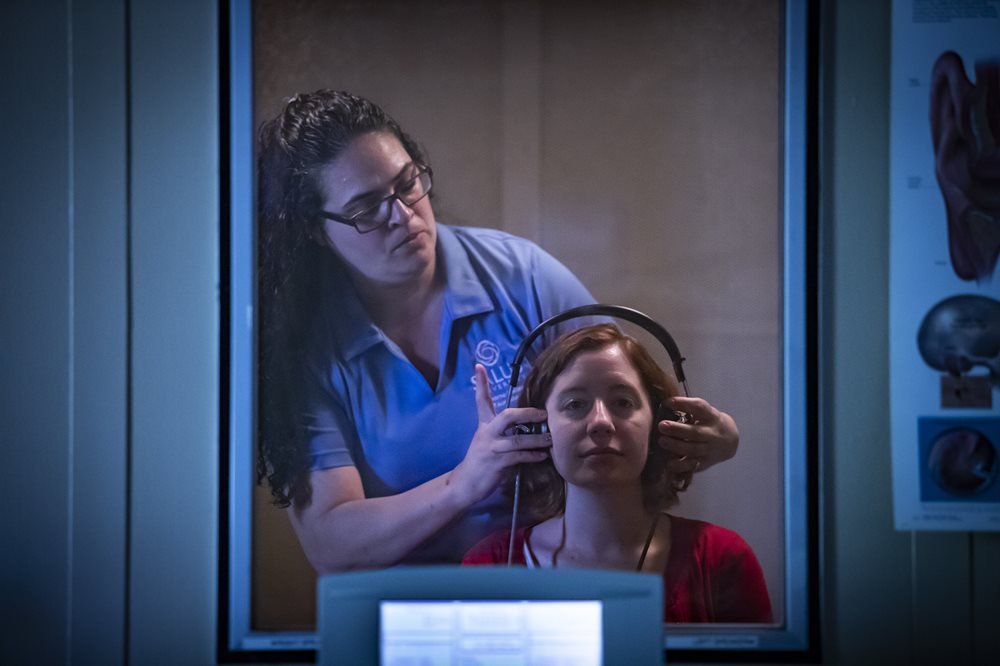Communicating with a person who has a hearing loss can be stressful for both parties. Even when hearing devices are used, proper communication strategies are essential for maximizing the experience. Follow these simple tips to improve communication with your hearing impaired friends, family and co-workers:
 Maintain eye contact with the hearing impaired individual, facing them directly. Do not attempt to hold a conversation from another room. Lip reading and facial expressions play a large part in communicating for both sides of the conversation.
Maintain eye contact with the hearing impaired individual, facing them directly. Do not attempt to hold a conversation from another room. Lip reading and facial expressions play a large part in communicating for both sides of the conversation.- Make sure you have the person’s attention before beginning a conversation. Try saying the person’s name, touching their arm or using a gesture to get their attention.
- Speak naturally and clearly – don’t shout. Speak clearly, at a normal or slightly slower speed and enunciate your words. Speaking in a slightly louder voice may also help your listener understand, but be careful not to shout. Shouting distorts the sound of your words and can make lip reading more difficult. Pause between sentences to ensure what you are saying is understood.
- Do not cover your face with your hands or other objects. Individuals with hearing loss rely on visual cues to help follow the conversation, and sometimes find lip reading helpful. Avoid eating and drinking while conversing, as well.
- Try to find a quiet area free of background hearing impaired individual to miss out on noise. This can be distracting and cause the much of what you are saying. Turn off the television/music, move away from noisy areas and if you’re in a social environment, try to find a quiet place to sit or a seat in a restaurant that is away from the kitchen or large gatherings.
- Repeat yourself if necessary. Try using a different word or rephrasing your sentence if it is too confusing.
- Pay attention to the listener. If they look confused, offer to clarify what you have just said.
- Talk into their “good ear.” Many people who suffer from hearing loss tend to have one ear that is stronger than the other. Look for cues as to which ear that is, ask them if appropriate, and situate yourself on that side of your listener.
- Be understanding. You may feel understandably frustrated when interacting with the hearing impaired, but keep in mind how it must be for them on a daily basis. Be patient. Communicating with hearing loss is a cooperative effort and requires understanding from both sides.
 Below are tips for those with hearing loss to follow for improved communication:
Below are tips for those with hearing loss to follow for improved communication:
- Let people know you have hearing loss. Alerting them to your hearing loss allows them to use some of the above tips.
- Maintain a clear view of the speaker. Make sure the speaker’s face can be seen clearly to improve sound quality and provide visual clues and lip reading.
- Take pressure off the speaker. Repeat back the part of the sentence you did hear instead of making the person repeat the whole sentence.
- Clarify by asking the speaker if you heard their statement correctly. Restating the sentence can help avoid confusion on the topic.
- Consider your environment. Make sure there is adequate lighting for lip reading and facial clues. Do your best to have your communication partner in front of you and background noises behind you.
Communicating with a hearing loss can be frustrating for all parties, but simple adjustments to communication can help. The goals are to retain the involvement of the person with hearing loss and reduce the frustration of verbal communication.
If you suspect that you may have some degree of hearing loss, contact the Pennsylvania Ear Institute. Our expert audiologists will assess your hearing and make recommendations on how to address your hearing needs. For more information on PEI’s services or to make an appointment, call 215.780.3180.

 Maintain eye contact with the hearing impaired individual, facing them directly. Do not attempt to hold a conversation from another room. Lip reading and facial expressions play a large part in communicating for both sides of the conversation.
Maintain eye contact with the hearing impaired individual, facing them directly. Do not attempt to hold a conversation from another room. Lip reading and facial expressions play a large part in communicating for both sides of the conversation. Below are tips for those with hearing loss to follow for improved communication:
Below are tips for those with hearing loss to follow for improved communication: